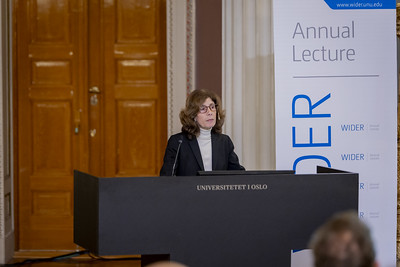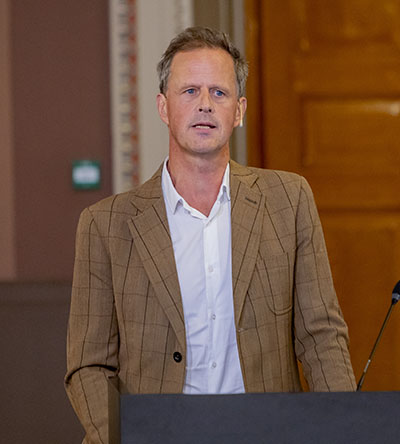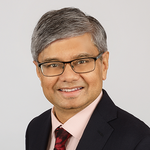Blog
Pinelopi Goldberg warns of the impact of deglobalization
Sobering insights from the 27th WIDER Annual Lecture
With several violent conflicts around the world weighing heavily on our minds, we attended the 27th WIDER Annual Lecture. Dr. Pinelopi Goldberg’s lecture on the potentially catastrophic consequences of a deglobalization movement are extremely relevant. In her lecture, titled ‘Globalization in crisis – confronting a new economic reality’, Goldberg delivered a well-researched account of the history of globalization and recent trends toward a deglobalization movement, outlining what may be causing this alarming shift.

Is globalization in crisis?
Goldberg’s argument involves an analysis of global trade data, which shows that, despite challenges, is not yet deglobalizing. However, she argues, if one looks at attitudes and public sentiment, a deglobalization movement has already begun.
Goldberg begins her lecture by asking, ‘Is globalization in crisis? When looking at the data, we don't see a clear deglobalization trend. We see a slowdown, but not a reversal of previous trends. On the other hand, if you look at policies and public sentiment, it’s fair to say we're in a new era’.
During the age of hyper-globalization, which she argues began in 1989 with the fall of the Berlin Wall, significant strides were made in reducing global inequality, raising living standards worldwide, and maintaining peace. Much of these gains are partially attributable to the strong economic bonds of this hyper-globalized economy. But hyper-globalization introduced a perceived trade-off—between reductions in global inequalities and increasing inequalities within high-income countries—that left some feeling left behind (for across and within country inequality trends, our WIID explorer provides comparisons of both).

Photo by Alexander Zach for UNU-WIDER
A perception of unfairness
The consequences of this increased perception of unfairness in high-income countries had lasting impacts, particularly in the UK and the US. In the first phase of the contemporary deglobalization movement (2015–COVID-19 pandemic), Goldberg identifies renewed disillusionment with globalization in public sentiment and policies, illustrated by Brexit, US–China trade tensions, and a rise in extremist views in Europe.
Phase two (2020–22) of the deglobalization wave occurs with the shock of the COVID-19 pandemic, but this shock also demonstrates the resilience of globalization, particularly in trade volumes when faced with supply chain disruptions, for example, in the ability to rapidly reconfigure supply chains to replenish medical supplies like medical masks.
Phase three (2022–onwards) began with Russia’s invasion of Ukraine and the related fallout, increasing concerns about the security implications of economic dependence and pushing the deglobalization movement to where we find ourselves today. In some of the most influential economies, policies, and support for open trade and commitments to reduce global inequality and poverty have lost popularity.
I can only hope that I will turn out to be totally wrong about this, or at least that there will be some reversal in policy that would lead us to a better path.
—Pinelopi Goldberg
These trends could have dire consequences, including higher prices if trade agreements are abandoned, increased inequality and poverty, and a slowdown of technological advancement due to trade restrictions, such as the US ban on the trade of semiconductor chips with China. Without the bonds created by global trade, governments have fewer incentives to maintain peace, which can lead to increased conflicts worldwide.
To emphasize this point, Goldberg drew an analogy between the current state of globalization and the period preceding World War II: ‘We have entered uncharted territory here… There are many parallels between what we are experiencing right now and what economic historians have called the pre-belligerence period before World War II, when there was a lot of trade, but it was not multilateral trade. It was regional and bilateral trade within spheres of influence and empires. There is a lot of work that shows that this made political tensions much worse. I can only hope that I will turn out to be totally wrong about this, or at least that there will be some reversal in policy that would lead us to a better path’.

Photo by Alexander Zach for UNU-WIDER
A potential alliance between reasonably paid workers
During the discussion, Halvor Melhum, economics professor at the University of Oslo, addressed two angles in response to Goldberg’s presentation regarding trade and fairness: fairness in the rules of the game and the fairness of trading conditions and outcomes, such as what determines the distribution of gains and the wage and working conditions of workers in countries engaged in trade.
‘We can ask whether these gains from trade are fairly distributed,’ he said, ‘and I think that people living in rich countries should admit that, from a moral standpoint, it’s generally unfair and to our advantage’.
One of Goldberg’s main points was that perceptions of unfairness, despite data to the contrary, lead to policy changes. Melhum posited that the abundance of cheap labour in Africa could further push liberal European governments toward extremist, populist, and protectionist policies, fearful that it may pose a threat to wages and living standards. He suggested a solution to this fear in which worldwide demand for decent working conditions and safety regulations might increase wages everywhere and reduce the threat to workers in rich countries.
Ending on a positive note, he remarked, ‘You could perhaps see a situation where working standards become a way to protect these workers. There is a potential alliance between reasonably paid, reasonably employed workers across the globe... A hypothesis, but, anyway, I'll stop there’.
Watch the 27th WIDER Annual Lecture by Pinelopi Goldberg here.
Kunal Sen is the UNU-WIDER Director and professor of development economics, University of Manchester.
The views expressed in this piece are those of the author(s), and do not necessarily reflect the views of the Institute or the United Nations University, nor the programme/project donors.
 Join the network
Join the network
